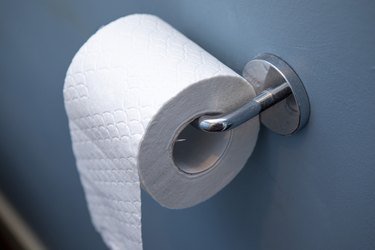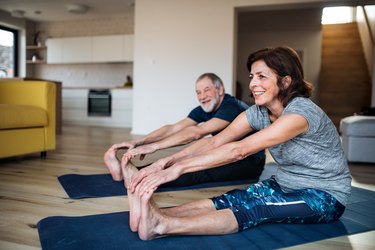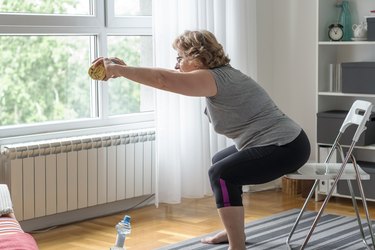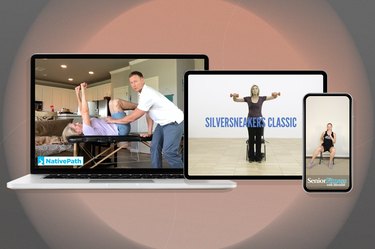
Getting older brings a bunch of bodily changes. And constipation is indeed one of those age-related health issues. Yep: As you accumulate candles on your birthday cake, you're more bound to get backed up.
We spoke to Reezwana Chowdhury, MD, a gastroenterologist and assistant professor of medicine at Johns Hopkins University, to better understand the causes of constipation in older adults, plus what you can do to help keep your bowels unblocked.
Video of the Day
Video of the Day
1. Less-Than-Ideal Dietary Habits
What you put on your plate can either promote or prevent regular poops. For many of us, the problem is inadequate fiber, Dr. Chowdhury says. The benefits of fiber include better digestion and bowel function, so when you're not getting enough, you might find yourself constipated.
In fact, the vast majority of American adults (95 percent) fall short of the recommended daily amount of fiber, according to a July 2016 article in the American Journal of Lifestyle Medicine.
What's more, some older adults experience a loss of taste and smell as they age, according to the Mayo Clinic. Not only can this change decrease your appetite (making it tougher to get nutrients like fiber), but it can also lead to less-nutritious dietary choices, as highly processed foods (which contain little or no fiber) tend to be more palatable.
Fix it: One of the best natural remedies for constipation is to pile your plate with fiber-rich foods like fruits, vegetables, whole grains and legumes. Per the 2020-2025 Dietary Guidelines for Americans, this is how much fiber adults ages 51 and older should aim for per day:
- People assigned female at birth: 22 g
- People assigned male at birth: 28 g
Tip
If you’re noticing a shift in your sense of smell or taste that’s tampering with your appetite, speak with your doctor. While some loss of taste and smell is normal with aging, other factors — including underlying conditions and certain medications — can be contributing to your impaired senses, per the Mayo Clinic.
2. Not Getting Enough Water
Water intake is also extremely important for a healthy gut and plentiful poops, Dr. Chowdhury says. That's because water softens your stool, which makes for easy-breezy bowel movements.
But when you're not sipping sufficient amounts of H2O, constipation can occur.
Here's why: Your colon draws water and nutrients from partially digested food to nourish the body, per the National Cancer Institute. So when you don't have a lot of H2O, your colon absorbs whatever water is available to meet your body's needs, leaving very little left over for your stool, which becomes dry, hard and difficult to pass.
And this lack of fluids is a problem for many older adults. Case in point: Dehydration is a common cause of hospitalization in older people, according to the Cleveland Clinic.
In some older folks, this dehydration may be due in part to a medically necessary fluid restriction that's required to manage various health conditions (for example, heart failure), Dr. Chowdhury says.
Fix it: As long as your doctor hasn't instructed you to do otherwise, stay hydrated by drinking about eight glasses of water (a total of 64 ounces) per day, Dr. Chowdhury says. If you're not partial to plain water, toss in fresh fruits or herbs for a little flavor.
How Much Water Should You Drink?
For a more customized estimate of how much water you should drink per day, try this equation:
Body weight (in pounds) ÷ 2 = minimum ounces of water you should drink a day
3. Decrease in Gut Motility
As we age, we lose muscle mass, and this can affect gut motility and contribute to constipation in older adults. That's because the intestinal walls are lined with layers of muscle, which contract to move food through your digestive system. So when these muscles aren't working as well as they used to, you might find yourself backed up.
Indeed, when you get older, the muscular activity in your intestinal tract tends to decline, which lengthens the time it takes for poop to pass through the intestines, according to the University of Michigan Health.
There's also an age-related decrease in the number of gut cells that involve propulsion, Dr. Chowdhury says. This means that your gut produces fewer contractions to squeeze stool along the digestive tract, which slows down your gut transit time and can cause constipation.
Fix it: If your poop problem is due to a decrease in gut motility, your doctor might prescribe you a medication to help promote colon muscle movements, Dr. Chowdhury says.
4. Certain Medications
With age, there's a greater probability of developing long-term health conditions that require medicines. Unfortunately, certain medications can clog up your digestive system.
For example, many older adults take diuretics to manage diseases like heart failure, but these drugs can be dehydrating, Dr. Chowdhury says. As we already know, not getting enough fluids can dry out your fecal matter and prevent you from pooping regularly.
Dr. Chowdhury says other medications can also sabotage your stool schedule and cause constipation, including:
- Opioids (prescription pain meds)
- Anticholinergics (used to treat a range of conditions, including asthma, COPD, overactive bladder and symptoms of Parkinson's disease)
- Antidepressants
- Allergy medicines
- Drugs used to treat blood pressure
- Drugs used to treat dementia
Fix it: Even if you suspect your meds are meddling with your bowel movements, don't just stop taking them, as this could be dangerous, Dr. Chowdhury says. Instead, talk to your doctor, who may be able to adjust your dosage or prescribe a different medicine.
Additionally, make sure you're drinking enough water, taking in ample fiber and getting daily exercise, she says. And if you're still struggling with constipation, you might try an over-the-counter laxative like MiraLAX (Amazon, $24.48) to find relief.
5. Moving Less
When we're older, we tend to move around less and sit more, Dr. Chowdhury says. But this sedentary lifestyle can slow down your gastrointestinal tract.
"I'm a full believer that as you move, your gut moves," Dr. Chowdhury says. In other words, activity stimulates the gut and benefits your bowel movements, which is why being less physically active may contribute to constipation.
Fix it: Try to fit in 30 minutes of exercise or physical activity per day, Dr. Chowdhury says. It doesn't need to be super strenuous, either — a simple stroll can get the juices flowing.
6. Mobility Issues That Cause Pain
Mobility issues caused by aging or illness can also mess with your toilet habits. For example, age-related conditions such as arthritis — which can cause stiffness and pain — might make sitting on the toilet uncomfortable, according to the University of Michigan Health.
And if your arthritis restricts mobility and limits your physical activity level, this can further contribute to constipation, Dr. Chowdhury says. (Remember, movement is good for the gut.)
Similarly, people with sciatica (which is more common as you age), nerve issues or nervous system diseases such as Parkinson's disease or multiple sclerosis might have trouble sitting on the toilet comfortably, Dr. Chowdhury says. And when you're in pain, it's difficult to relax, which is necessary for your muscles to release stool.
Neurological disorders can also affect the muscles and nerves in your anal canal and pelvic floor (more on this later), preventing the proper contraction and release that's necessary to push out poop, Dr. Chowdhury says.
Fix it: Try to make the toilet experience a tad more comfortable. Dr. Chowdhury recommends placing a stool under your feet, like the Squatty Potty (Amazon, $24.99). This can help open the angle to allow bowel movements to come out more easily, she says.
7. Weak Pelvic Floor Muscles
Once again, our muscle mass declines with age, which affects all muscles in our body, including the pelvic floor. Pregnancy, childbirth and menopause can also weaken your pelvic floor muscles over the years.
But this poses a big conundrum for constipation, because your pelvic floor muscles play a pivotal role in your ability to poop properly. When the nerves and the muscles in your pelvic floor don't coordinate for proper contraction and relaxation (known as pelvic floor dyssynergia), you'll encounter problems propelling stool out, Dr. Chowdhury says.
Fix it: See your gastroenterologist, who can perform an anorectal manometry, an exam that helps to diagnose pelvic floor dysfunction, Dr. Chowdhury says.
If you're dealing with pelvic floor dyssynergia, your doctor may refer you to a pelvic floor physical therapist who can help you train your pelvic floor muscles and nerves to properly coordinate, contract and relax.
Related Reading
4 More Things You Can Do to Combat Constipation
While constipation in older adults is common, there are things you can do in the present to prevent this problem. In addition to getting adequate fiber, exercising daily and properly hydrating, follow these good bathroom habits to help you avoid constipation as you age.
1. Don’t Linger on the Toilet
A lot of people use toilet time as an opportunity to read the paper or catch up on their social media. But that's a major mistake, because sitting on the throne for too long can predispose you to poop problems in the future.
The longer you sit there, the more potential damage you're doing to your rectum and pelvic floor muscles, especially if you strain, Dr. Chowdhury says.
So how long should a stool session be? Five minutes, tops. "If it's not coming out, get up and do something else," Dr. Chowdhury says.
And leave your cell phone in another room. "It's not the time to get on Facebook or Instagram," she says.
2. Start Using a Foot Stool
Western toilets aren't designed in a way that allows for proper relaxation and contraction, Dr. Chowdhury says. "Squatting on the floor is the proper way to open up the rectum and relax the area for a bowel movement," she says.
But if you're unlikely to pop a squat to take a poop, you should invest in a stool to prop up your feet. Again, this will put your body in an optimal position to release stool.
3. Try Deep Breathing
Diaphragmatic breathing can benefit you in the defecation department. Try taking a deep belly breath and exhaling for 10 seconds, pushing the stomach forward. This helps to relax the anus and allows the bowel movement to occur, Dr. Chowdhury says.
4. Go When You Feel the Urge
People who hold in stool and wait to go later are causing themselves damage down the road, Dr. Chowdhury says. By delaying defecation, you're essentially developing harmful habits and training your muscles to do the wrong thing.
"So when you have that urgency, you should go," Dr. Chowdhury says — right away.
- American Journal of Lifestyle Medicine: “Closing America’s Fiber Intake Gap”
- Mayo Clinic: “Is loss of taste and smell normal with aging?”
- National Cancer Institute: “Colon”
- University of Michigan Health: “Constipation, Age 12 and Older”
- U.S. Department of Agriculture and U.S. Department of Health and Human Services: "2020-2025 Dietary Guidelines for Americans"
- Cleveland Clinic: "Drink Up: Dehydration is an Often Overlooked Health Risk for Seniors"
Is this an emergency? If you are experiencing serious medical symptoms, please see the National Library of Medicine’s list of signs you need emergency medical attention or call 911.



